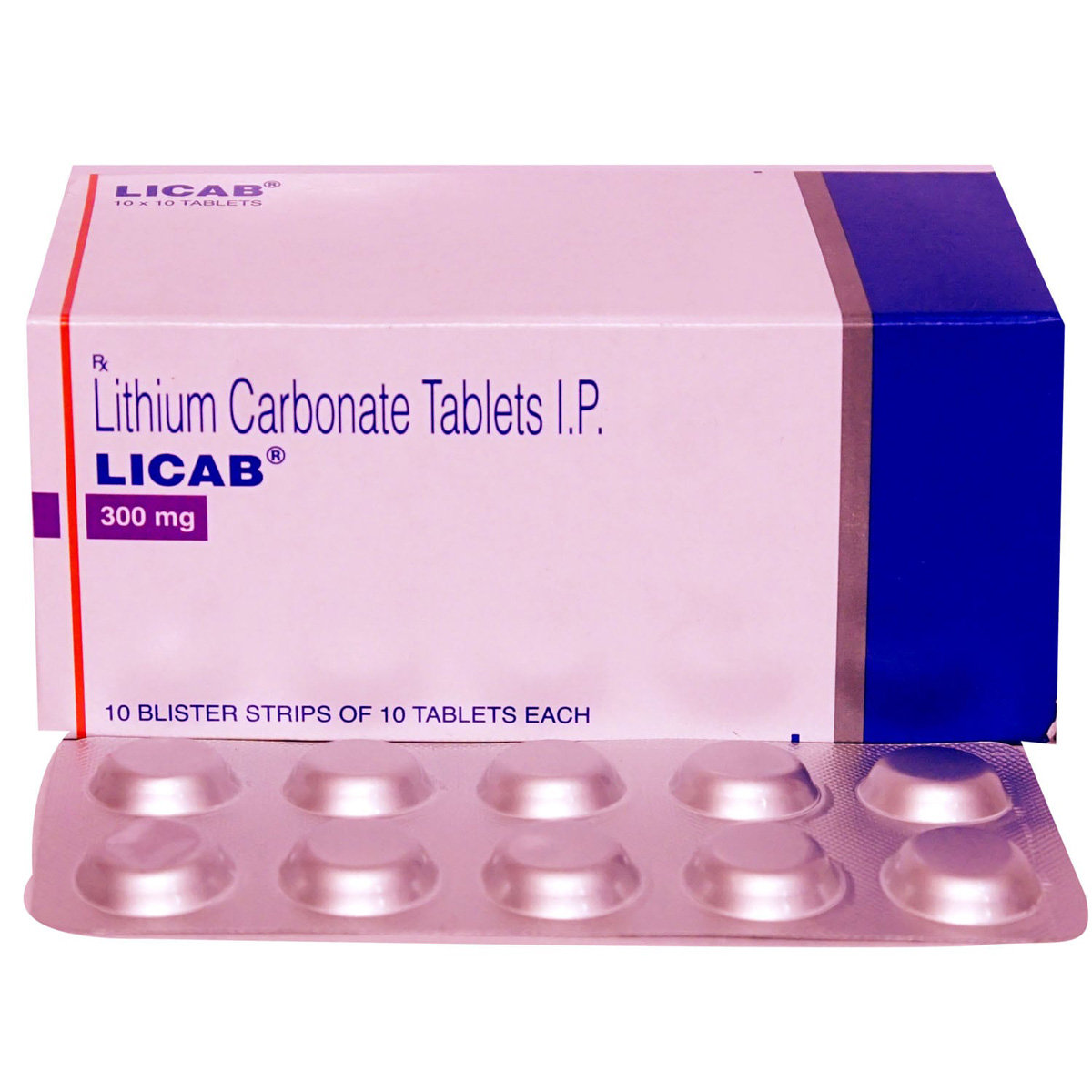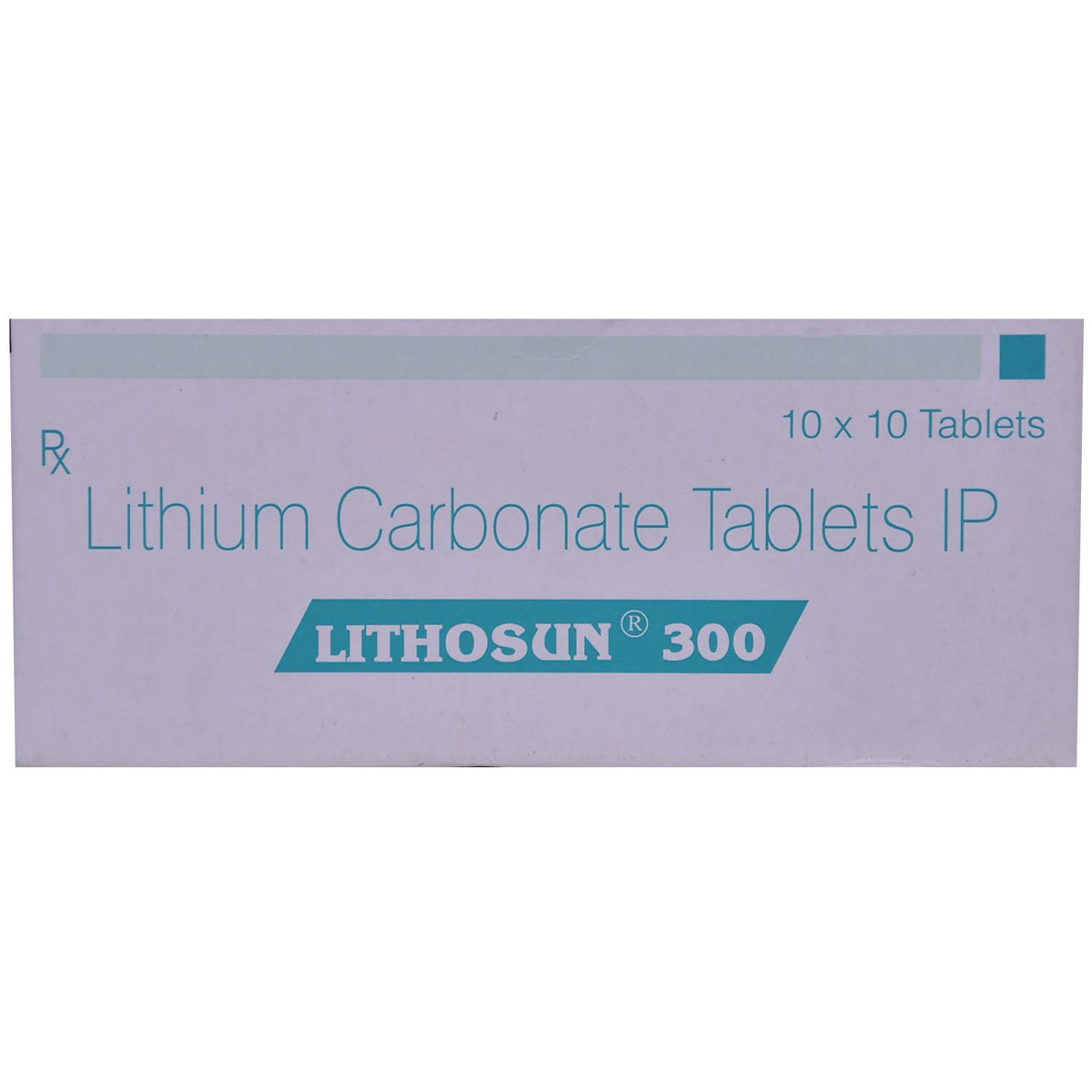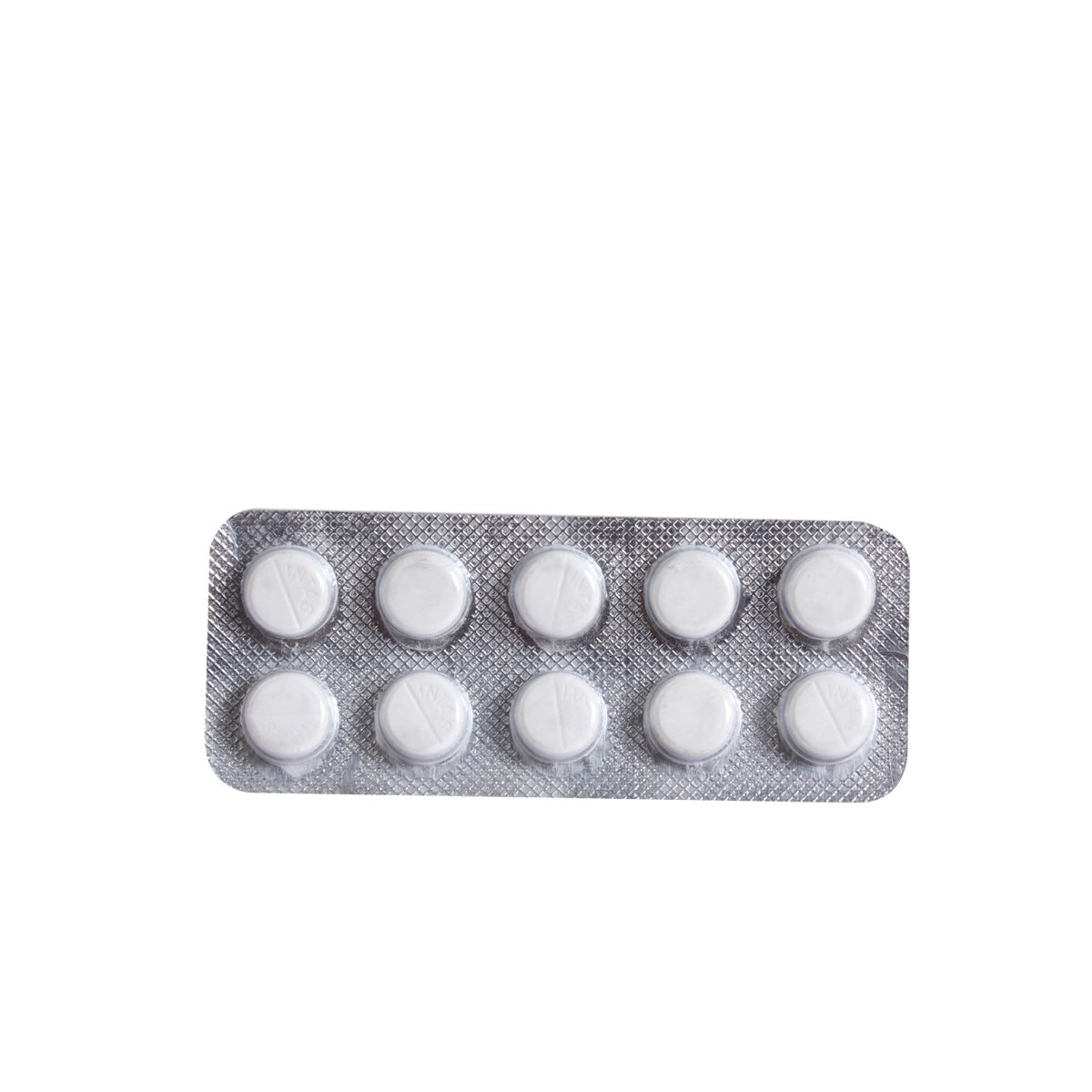T-Lith 300 mg Tablet 10's
MRP ₹16.5
(Inclusive of all Taxes)
₹2.5 Cashback (15%)
Provide Delivery Location
Online payment accepted
 Prescription drug
Prescription drugWhats That
Composition :
Manufacturer/Marketer :
Consume Type :
Expires on or after :
Return Policy :
About T-Lith 300 mg Tablet
T-Lith 300 mg Tablet belongs to a psychological class of drugs called 'Anti-manic agents' or 'Mood stabilizers' primarily used to prevent and treat mood disorders like mania and bipolar disorder. Mania is a mental condition that causes intense excitement, high energy, and delusions (misbeliefs). Bipolar disorder is a mental condition associated with extreme mood swings ranging from the hyper stage of mania to low mood depression.
T-Lith 300 mg Tablet contains Lithium that helps to treat mental disorders by increasing the activity of chemical messengers in the brain thereby, suppressing the excessive and abnormal activity of nerve cells in the brain and helps in stabilizing a person’s mood.
Take T-Lith 300 mg Tablet as prescribed. Your doctor will advise how often you take T-Lith 300 mg Tablet based on your medical condition. Some people may experience loss of appetite, dizziness, dry mouth, taste change, diarrhoea, blurred vision, slurred speech, shaky movements, increased thirst, and urination. Most of these side effects of T-Lith 300 mg Tablet do not require medical attention and gradually resolve over time. However, if the side effects persist or worsen, please consult your doctor.
If you are known to be allergic to T-Lith 300 mg Tablet or any other medicines, please tell your doctor. If you are pregnant or breastfeeding, it is advised to consult a doctor before using T-Lith 300 mg Tablet . Regular blood tests are recommended while taking T-Lith 300 mg Tablet to monitor the levels of lithium in blood. If you have fits, kidney or heart problems, thyroid, persistent headache, vision problems, and if you are planning or had weight loss surgery, please inform your doctor before taking T-Lith 300 mg Tablet .
Uses of T-Lith 300 mg Tablet
Directions for Use
Key Benefits
T-Lith 300 mg Tablet is a mood stabilizer that is used to prevent and treat mood disorders such as mania and bipolar disorder. T-Lith 300 mg Tablet contains Lithium that helps to treat mental disorders by increasing the activity of chemical messengers in the brain thereby, suppressing the excessive and abnormal activity of nerve cells in the brain and helps in stabilizing a person’s mood. Thus, T-Lith 300 mg Tablet relaxes nerves and calms the mood, which helps in having a better social life and enables to do daily activities comfortably.
Storage
- Notify your doctor immediately if you experience tremors or involuntary shaking after taking medication or adjusting your medication regimen.
- Your doctor may adjust your medication regimen or recommend alternative techniques like relaxation, meditation, or journaling to alleviate tremor symptoms.
- Your doctor may direct you to practice stress-reducing techniques, such as deep breathing exercises, yoga, or journaling.
- Regular physical activity, such as walking or jogging, can help reduce anxiety and alleviate tremor symptoms.
- Your doctor may recommend lifestyle changes, such as avoiding caffeine, getting enough sleep, and staying hydrated, to help manage tremors.
- Maintain regular follow-up appointments with your doctor to monitor tremor symptoms and adjust treatment plans as needed.
- Reduce fluid intake 2-3 hours prior to bedtime.
- Limit alcohol and caffeine as they can increase urination and affect bladder health.
- Maintain sleep hygiene.
- Eat a low-salt and healthy diet.
- Inform your doctor about the nausea and discuss possible alternatives to the medication or adjustments to the dosage.
- Divide your daily food intake into smaller, more frequent meals to reduce nausea.
- Opt for bland, easily digestible foods like crackers, toast, plain rice, bananas, and applesauce.
- Avoid certain foods that can trigger nausea, such as fatty, greasy, spicy, and smelly foods.
- Drink plenty of fluids, such as water, clear broth, or electrolyte-rich beverages like coconut water or sports drinks.
- Use ginger (tea, ale, or candies) to help relieve nausea.
- Get adequate rest and also avoid strenuous activities that can worsen nausea.
- Talk to your doctor about taking anti-nausea medication if your nausea is severe.
- Record when your nausea occurs, what triggers it, and what provides relief to help you identify patterns and manage your symptoms more effectively.
- Preventing Vomiting (Before it Happens)
- Take medication exactly as prescribed by your doctor. This can help minimize side effects, including vomiting.
- Having a small meal before taking your medication can help reduce nausea and vomiting.
- Talk to your doctor about taking anti-nausea medication along with your prescribed medication.
- Managing Vomiting (If it Happens)
- Try taking ginger in the form of tea, ale, or candy to help alleviate nausea and vomiting.
- What to Do if Vomiting Persists
- Consult your doctor if vomiting continues or worsens, consult the doctor for guidance on adjusting your medication or additional treatment.
- Confusion is a major psychotic disorder that needs immediate medical attention.
- Acknowledge your experience and put effort to control confusion.
- Avoid smoking and alcohol intake as it can worsen the condition and increase your confusion.
- Practice meditation and yoga to avoid anxiety, which can be one of the leading causes.
- Talk to your dietician and consume food that can improve your mental health.
- Inform your doctor about dry mouth symptoms. They may adjust your medication regimen or prescribe additional medications to manage symptoms.
- Drink plenty of water throughout the day to help keep your mouth moist and alleviate dry mouth symptoms.
- Chew sugar-free gum or candies to increase saliva production and keep your mouth moisturized.
- Use saliva substitutes, such as mouthwashes or sprays, only if your doctor advises them to help moisturize your mouth and alleviate dry mouth symptoms.
- Avoid consuming smoking, alcohol, spicy or acidic foods, and other irritants that may aggravate dry mouth symptoms.
- Schedule regular dental check-ups to keep track of your oral health and handle any dry mouth issues as they arise.
Drug Warnings
Regular blood tests are recommended while taking T-Lith 300 mg Tablet to check lithium levels in blood. If you are pregnant or breastfeeding, please inform your doctor before taking T-Lith 300 mg Tablet . If you have hypothyroidism (underactive thyroid gland), please inform your doctor before taking T-Lith 300 mg Tablet as it may cause low thyroid levels. If you notice decreased amount of urine, dark, reddish urine, muscle pain or weakness, inform your doctor immediately as it may be due to a serious condition called rhabdomyolysis (muscle tissue breakdown) which may lead to kidney problems.
Drug-Drug Interactions
Drug-Drug Interactions
Login/Sign Up
Taking Cisapride with T-Lith 300 mg Tablet can increase the risk of irregular heart rhythm.
How to manage the interaction:
Taking T-Lith 300 mg Tablet with Cisapride is not recommended as it can possibly result in an interaction, but it can be taken together if prescribed by a doctor. However, consult your doctor if you experience sudden dizziness, lightheadedness, fainting, shortness of breath. Do not discontinue any medications without consulting a doctor.
Cidofovir can cause higher levels of T-Lith 300 mg Tablet carbonate in the blood which increases risk of kidney problems.
How to manage the interaction:
Taking T-Lith 300 mg Tablet with Cidofovir is not recommended, but can be taken together if prescribed by a doctor. However, if you experience nausea, vomiting, loss of appetite, increased or decreased urination, sudden weight gain or loss, fluid retention, swelling, shortness of breath, muscle cramps, tiredness, weakness, dizziness, confusion, or an irregular heart rhythm, consult a doctor. Do not discontinue any medications without consulting a doctor.
Co-administration of Mefenamic acid with T-Lith 300 mg Tablet can increase T-Lith 300 mg Tablet levels in the body.
How to manage the interaction:
Taking Mefenamic acid with T-Lith 300 mg Tablet together can result in an interaction, it can be taken if your doctor has advised it. However, if you notice any drowsiness, dizziness, confusion, loose stools, vomiting, muscle weakness, muscle incoordination, shaking of hands and legs, blurred vision, ringing in the ear, excessive thirst, and/or increased urination, contact a doctor. Do not stop using any medications without talking to a doctor.
Co-administration of Flurbiprofen with T-Lith 300 mg Tablet may significantly increase the blood levels of T-Lith 300 mg Tablet.
How to manage the interaction:
There may be a possibility of interaction between Flurbiprofen and T-Lith 300 mg Tablet, but it can be taken if prescribed by a doctor. However, if you experience drowsiness, dizziness, confusion, loose stools, vomiting, muscle weakness, muscle incoordination, shaking of hands and legs, blurred vision, ringing in the ear, excessive thirst and increased urination contact your doctor immediately. Do not stop using any medications without a doctor's advice.
Coadministration of Naproxen and T-Lith 300 mg Tablet may increase the blood levels and side effects of T-Lith 300 mg Tablet.
How to manage the interaction:
Taking Naproxen and T-Lith 300 mg Tablet together can possibly result in an interaction, it can be taken if your doctor has advised it. However, if you experience drowsiness, dizziness, confusion, loose stools, vomiting, muscle weakness, muscle incoordination, shaking of hands and legs, blurred vision, ringing in the ear, excessive thirst, and increased urination, consult the doctor. Do not discontinue any medication without a doctor's advice.
Taking T-Lith 300 mg Tablet with amiloride can enhance the effects of T-Lith 300 mg Tablet.
How to manage the interaction:
Although taking amiloride and T-Lith 300 mg Tablet together can result in an interaction, it can be taken if a doctor has prescribed it. However, consult the doctor if you experience nausea, vomiting, loose stools, sleepiness, muscular weakness, a shaking sensation, loss of coordination, blurred vision, or ringing in the ears. Do not discontinue any medications without a doctor's advice.
Coadministration of Ivabradine with T-Lith 300 mg Tablet can increase the risk of irregular heart rhythms.
How to manage the interaction:
Taking Ivabradine with T-Lith 300 mg Tablet together can result in an interaction, it can be taken if your doctor has advised it. However, contact a doctor immediately if you experience sudden dizziness, lightheadedness, fainting, shortness of breath, chest pain or tightness, rapid heartbeat, or unusual memory loss. Do not discontinue any medications without consulting a doctor.
Perindopril when taken together with T-Lith 300 mg Tablet may significantly increase the blood levels of T-Lith 300 mg Tablet.
How to manage the interaction:
Although there is drug interaction between perindopril and T-Lith 300 mg Tablet, but can be taken together if advised by a doctor. if experience dizziness, confusion, diarrhea, vomiting, muscle weakness, tremor (shaking of hand & legs) blurred vision, ringing in the ear, excessive thirst, and/or increased urination consult a doctor immediately. Do not discontinue medications without consulting a doctor.
Taking T-Lith 300 mg Tablet together with Efavirenz can increase the risk of an irregular heart rhythm.
How to manage the interaction:
Co-administration of T-Lith 300 mg Tablet with Efavirenz can result in an interaction, but it can be taken if your doctor has advised it. However, consult the doctor immediately if you experience symptoms such as dizziness, lightheadedness, fainting, shortness of breath, or heart palpitations. Do not stop using any medications without consulting doctor.
Co-administration of Amiodarone together with T-Lith 300 mg Tablet may raise the risk of an abnormal heart rhythm.
How to manage the interaction:
Even though Amiodarone and T-Lith 300 mg Tablet interact, they can be used if prescribed by a doctor. If you have heart problems or electrolyte imbalances, you may be at greater risk. If you experience abrupt dizziness, lightheadedness, fainting, shortness of breath, or rapid heartbeat, get medical attention. Do not discontinue any medications without consulting a doctor.
Drug-Food Interactions
Drug-Food Interactions
Login/Sign Up
Diet & Lifestyle Advise
- Avoid low-sodium diet as it may increase lithium levels in blood and cause adverse effects.
- Limit the intake of caffeine as it may reduce the effectiveness of T-Lith 300 mg Tablet .
- Do regular exercise and maintain a stable weight as T-Lith 300 mg Tablet may cause weight gain.
- Drink plenty of water to avoid dehydration and try to drink same amount of water everyday as any major changes in quantity may affect lithium levels.
- Avoid consumption of alcohol as it may increase drowsiness.
Side Effects of T-Lith 300 mg Tablet
- Loss of appetite
- Dizziness
- Dry mouth
- Taste change
- Diarrhoea
- Blurred vision
- Slurred speech
- Shaky movements
- Increased thirst and urination
Habit Forming
Therapeutic Class
All Substitutes & Brand Comparisons
RX
Out of StockLALITHIUM 300MG TABLET
Troikaa Pharmaceuticals Ltd
₹14.78
(₹1.33 per unit)
10% CHEAPERRX
Out of StockLithonex-300 Tablet 10's
Theo Pharma Pvt Ltd
₹18
(₹1.62 per unit)
8% COSTLIERRX
Licab Tablet 10's
Torrent Pharmaceuticals Ltd
₹25.5
(₹2.3 per unit)
54% COSTLIER
Author Details
We provide you with authentic, trustworthy and relevant information
Drug-Diseases Interactions
Drug-Diseases Interactions
Login/Sign Up
FAQs
Drug-Drug Interactions Checker List
- RAMIPRIL
- LISINOPRIL
- METHYLDOPA
- AMLODIPINE
- DILTIAZEM
- IBUPROFEN
- DICLOFENAC
- CELECOXIB
- INDOMETHACIN
- THEOPHYLLINE
- OLANZAPINE
- HALOPERIDOL
- CLOZAPINE
- SERTINDOLE
- PHENYTOIN
- CLONAZEPAM
- CARBAMAZEPINE
- QUINIDINE
- AMIODARONE
- PROPAFENONE
- RANOLAZINE
- PROCAINAMIDE
- DISOPYRAMIDE
- HYDROQUINIDINE
- IBUTILIDE
- SOTALOL
- DOFETILIDE
- PAROXETINE
- AMITRIPTYLINE
- FLUOXETINE
- TRIMETHOPRIM
- SPECTINOMYCIN
- METRONIDAZOLE
- TETRACYCLINE
Special Advise
- Regular blood tests are advised every week while taking T-Lith 300 mg Tablet to monitor the levels of lithium in blood. When lithium levels are constant, blood tests may be done for every 3 months.
- Drink constant amount of water daily and maintain a constant sodium intake as any major changes in these two may alter the levels of lithium in blood.
Disease/Condition Glossary
Mania: It is a mental condition which causes intense excitement, high energy and delusions (misbeliefs). Mania may occur due to lack of sleep or changes in sleep pattern, high levels of stress and alcohol intake. Seek medical help immediately if you have any self-harming or suicidal thoughts. Bipolar disorder also called as maniac depression is a mental condition associated with extreme mood swings ranging from maniac highs to depressive lows. The symptoms of bipolar disorder include mania (high energy and excitability) and depression (loss of interest, hopelessness, low energy). Bipolar disorder involves lifelong treatment.

Have a query?
Alcohol
Safe if prescribed
You are recommended to avoid consumption of alcohol with T-Lith 300 mg Tablet as it may increase the risk of side effects such as drowsiness, dizziness or difficulty in concentrating.
Pregnancy
Consult your doctor
T-Lith 300 mg Tablet is a Category D pregnancy drug and is not recommended for use during pregnancy as it may cause harm to the unborn baby.
Breast Feeding
Consult your doctor
Avoid breastfeeding while taking T-Lith 300 mg Tablet as it may be excreted in breast milk and cause adverse effects in the baby.
Driving
Safe if prescribed
T-Lith 300 mg Tablet may cause dizziness, drowsiness or other severe adverse effects. Therefore, avoid driving if you feel drowsy or dizzy after taking T-Lith 300 mg Tablet .
Liver
Consult your doctor
T-Lith 300 mg Tablet is safe to use in patients with Liver diseases/conditions if prescribed by a doctor.
Kidney
Consult your doctor
Take T-Lith 300 mg Tablet with caution, especially if you have a history of Kidney diseases/conditions. The dose may be adjusted by your doctor as required. T-Lith 300 mg Tablet is not recommended for patients with severe kidney problems.
Children
Safe if prescribed
T-Lith 300 mg Tablet is generally not recommended for children below 12 years. However, T-Lith 300 mg Tablet may be used in children above 7 years for treating bipolar I disorder only if prescribed by a doctor.











